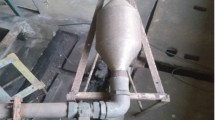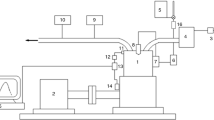Abstract
Magnetic field-assisted combustion has been under the focus of research for the last three decades around the globe. The effects of strong uniform and gradient magnetic fields on flame development, behaviour and propagation have been studied, and their applications have been experimented on Internal Combustion Engines. The present work investigates the synergetic effect of part-cooled EGR on the magnetic field-assisted combustion of liquefied petroleum gas in a multicylinder MPFI spark-ignited engine modified for neat LPG operation. Sintered neo-delta magnets with radial magnetization pattern of four different magnetic intensities (0G, 3200G, 4800G and 6400G) are fastened to the fuel line near to the gas injector with a non-magnetic stainless steel integument to prevent any loss of magnetic intensities during the operation. A portion of the exhaust gas is channelled to an intercooler and an optimum percentage of the partially cooled gases are inducted into the inlet manifold for combustion. The experimental study concludes that the optimum flow rate of part-cooled EGR acts synergistically with the applied magnetic fields to enhance the combustion characteristics of LPG emanating an improved fuel economy of 13.8% and brake thermal efficiency of 3.9%. The increased emission of oxides of Nitrogen which is the major setback of LPG combustion can be addressed through the combined effect of part-cooled EGR and magnetic field-assisted combustion. Moreover, the reduction in stability of combustion through the recirculation of exhaust can also be balanced by the applied magnetic field.

















Similar content being viewed by others
Abbreviations
- NdFeB:
-
Neodymium iron boron permanent magnet
- MPFI:
-
Multipoint port fuel injection
- EGR:
-
Exhaust gas recirculation
- BP:
-
Brake power
- BTE:
-
Brake thermal efficiency
- BSFC:
-
Brake-specific fuel consumption
- NHRR:
-
Net heat release rate
- IMEP:
-
Indicated mean effective pressure
- COV:
-
Coefficient of variation
- CO:
-
Carbon monoxide
- CO2 :
-
Carbon dioxide
- HC:
-
Hydrocarbon
- NOx :
-
Oxides of nitrogen
References
Masi, M.: Experimental analysis on a spark ignition petrol engine fueled with LPG. Energy 41, 252–260 (2011). https://doi.org/10.1016/j.energy.2011.05.029
Byraktar, H.; Durgun, O.: Investigating the effects of LPG on spark ignition engine combustion and performance. Energy Convers. Manag. 46, 2317–2333 (2005). https://doi.org/10.1016/j.enconman.2004.09.012
Yusaf, T.; Saleh, K.; Said, M.: Engine performance and emission analysis of LPG SI engine with the aid of artificial neural network. Proc. IMechE Part A J. Power and Energy (2011). https://doi.org/10.1177/0957650911402546
Nayak, V.; Rashmi, G.; Chitragar, P.; Mohanan, P.: Combustion characteristics and cyclic variations of a LPG fueled MPFI four cylinder gasoline engine. Energy Procedia 90, 470–480 (2016)
Badr, O.; Alsayed, N.; Manaf, M.: A parametric study on the lean misfiring and knocking limits of gas fuelled spark ignition engines. Appl. Therm. Eng. 18(7), 579–594 (1998)
Ueno, S.; Harada, K.: Effect of magnetic fields on flames and gas flow. IEEE Trans. Magn. 21(5), 2752–2754 (1985)
Ueno, S.; Harada, K.: Magnetic field effect on combustion. IEEE Trans. Magn. 21, 2077–2079 (1987)
Guo, H.; Chen, Y.; Yao, R.: A study of magnetic effects on the physiochemical properties of individual hydrocarbons. IEEE Trans. Magn. 22 (1986)
Aoki, T.: Radicals emissions and butane diffusion flames exposed to upward-decreasing magnetic fields. Jpn. J. Appl. Phys. 28, 776–785 (1989)
Morozov, Y.; Kuznetsov, M.: Effect of magnetic fields on combustion emf. Combust. Explos. Shock Waves 35, 18–22 (1999)
Legros, G.; Gomez, T.; Fessard, M.; Torero, J.: Magnetically induced flame flickering. Proc. Combust. Inst. 33, 1095–1103 (2011). https://doi.org/10.1016/j.proci.2010.06.124
Barmina, I.; Zake, M.: Magnetic field control of combustion dynamics. Latv. J. Phys. Tech. Sci. 53(4), 36–46 (2017)
Barmina, I.; Bucenieks, I.; Gedrovics, M.; Zake, M.: The magnetic field effect on the swirling combustion of the renewable fuel, co-firing of the renewable with fossil fuel for the clean and effective heat energy production. Sci. J. Riga Tech. Univ. 13, 21–29 (2009)
Sahoo, R.; Jain, A.: Experimental analysis of nanofuel additives with magnetic fuel conditioning for diesel engine performance and emissions. Fuel 236, 365–372 (2019). https://doi.org/10.1016/j.fuel.2018.09.027
Oommen, Libin P.; Kumar, G.N.: A study on the effect of magnetic field on the properties and combustion of hydrocarbon fuels. Int. J. Mech. Prod. Eng. Res. Dev. 9, 89–98 (2019)
Faris, A.; Saadi, K.; Jamal, N.; Isse, R.; Abed, M.; Fouad, S.; Kazim, A.; Reheem, N.: Effect of magnetic field on fuel consumption and exhaust emission in two stroke engine. Energy Procedia 18, 327–338 (2012)
Abdel-Rehim, A.; Attia, A.: Does magnetic fuel treatment affect engine’s performance?. SAE Technical Paper (2014). http://dx.doi.org/10.4271/2014-01-1398
Govindasamy, P.; Dhandapani, S.: Performance and emissions achievements by magnetic energizer with a single cylinder two stroke catalytic coated spark ignition engine. J. Sci. Ind. Res. 66, 457–463 (2007)
Govindasamy, P.; Dhandapani, S.: Experimental investigation of cyclic variations of combustion parameters in catalytically activated and magnetically energized two-stroke SI engine. J. Energy Environ. 6, 45–59 (2007)
Evdokimov, I.; Kornishin, K.: Apparent disaggregation of colloids in a magnetically treated crude oil. Energy Fuels 23, 4016–4020 (2009)
Farrag, A.E.; Fatih, G.; Saber, M.: Effect of fuel magnetism on engine performance and emissions. Aust. J. Basic Appl. Sci. 4(12), 6354–6358 (2010)
Hayder, J.; Jaafar, S.; Ali, Abas A.: Effects of magnetic field on fuel consumption and exhaust, emissions in two-stroke engine. Energy Procedia 18, 327–338 (2012)
Kumar, V.; Patro, S.K.; Pudi, V.: Experimental study of a novel magnetic fuel ionization method in four stroke diesel engines. Int J Mech Eng Robot Res 3, 332–340 (2014)
Okoronkwo, C.A.; Nwachukwu, C.C.; Ngozi, L.C.; Igbokwe, J.O.: The effect of electromagnetic flux density on the ionization and the combustion of fuel. Am. J. Sci. Ind. Res. 3, 527–531 (2010)
Chen, C.; Lee, W.; Mwangi, J.; Wang, L.; Lu, J.: Impact of magnetic tube on pollutant emissions from the diesel engine. Aerosol Air Qual. Res. 17, 1097–1104 (2017)
Agarwal, D.; Singh, S.K.; Agarwal, A.K.: Effect of exhaust gas recirculation (EGR) on performance, emissions, deposits and durability of a constant speed compression ignition engine. Appl. Energy 88, 2900–2907 (2011)
Galloni, E.; Fontana, G.: Experimental analysis of a spark-ignition engine using exhaust gas recycle at WOT operation. Appl. Energy 87, 2187–2193 (2010)
Ravi, K.; Bhasker, J. P.; Alexander, J.; Porpatham, E.: Influence of cooled exhaust gas recirculation on performance, emissions and combustion characteristics of LPG fuelled lean burn SI engine. In: IOP Conference Series: Materials Science and Engineering, vol. 263, p. 062069 (2016)
Park, S.; Cha, J.; Kwon, J.; Cho, Y.: The effect of exhaust gas recirculation (EGR) on combustion stability, engine performance and exhaust emissions in a gasoline engine. KSME Int. J. 15, 1442–1450 (2001)
Abd-Allah, G.H.: Using exhaust gas recirculation in internal combustion engines: a review. Energy Convers. Manag. 43, 1027–1042 (2001)
Rakopoulos, C.D.; Rakopoulos, D.C.; Mavropoulos, G.C.; Kosmadakis, G.M.: Investigating the EGR rate and temperature impact on diesel engine combustion and emissions under various injection timings and loads by comprehensive two-zone modelling. Energy 157, 990–1014 (2018)
Oommen, Libin P.; Kumar, G.N.: Experimental studies on the impact of part-cooled high-pressure loop EGR on the combustion and emission characteristics of liquefied petroleum gas. J. Therm. Anal. Calorim. (2020). https://doi.org/10.1007/s10973-020-09762-0
Bozic, M.; Vuceticl, A.; Kozarac, D.; Lulic, Z.: Experimental investigation on influence of EGR on combustion performance in SI Engine. In: Digital Proceedings of the 8th European Combustion Meeting, pp. 18–21 (2017)
Cairns, A.; Blaxill, H.; Irlam, G.: Exhaust gas recirculation for improved part and full load fuel economy in a turbocharged gasoline engine. SAE Technical Paper series, No. 01-0047 (2006)
Morcos, A.; Brown, D.; Campbell, P.: Nd–Fe–B magnets for electric power steering (EPS) applications. In: Magnequench Technology Center, 9000 Development Dr., Research Triangle Park (2002)
Oommen, Libin P.; Kumar, G.N.: Experimental studies on the influence of axial and radial fields of sintered neo-delta magnets in reforming the energy utilization combustion and emission properties of a hydrocarbon fuel. Energy Sources Part A Recovery Util. Environ. Eff. (2020). https://doi.org/10.1080/15567036.2020.1767729
Author information
Authors and Affiliations
Corresponding author
Rights and permissions
About this article
Cite this article
Oommen, L.P., Narayanappa, K.G. & Vijayalakshmi, S.K. Experimental Analysis of Synergetic Effect of Part-Cooled Exhaust Gas Recirculation on Magnetic Field-Assisted Combustion of Liquefied Petroleum Gas. Arab J Sci Eng 45, 9187–9196 (2020). https://doi.org/10.1007/s13369-020-04696-z
Received:
Accepted:
Published:
Issue Date:
DOI: https://doi.org/10.1007/s13369-020-04696-z




